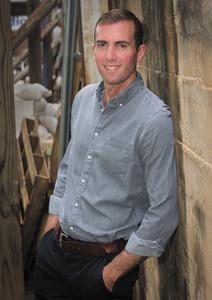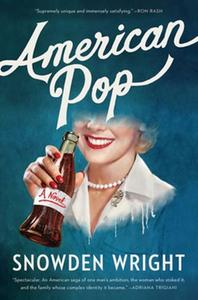
|
|
| photo: Lorikay Stone Photography | |
Snowden Wright is the author of the novels Play Pretty Blues (Engine Books, 2013) and American Pop (Morrow, February 5, 2018). He has written for the Atlantic, Salon, Esquire and the New York Daily News, among other publications. A former Stone Court Writer-in-Residence, Wright lives in Atlanta, Ga.
On your nightstand now:
Kate Atkinson's Transcription and Kiese Laymon's Heavy and Lauren Wilkinson's American Spy. I've finished the first two and am working my way through the third. The combo wasn't intentional, but American Spy is almost an amalgamation of Transcription and Heavy, the former a jaunty British spy novel set shortly before World War II, the latter an elegant, febrile meditation on the African American experience. American Spy follows a young black woman who's part of a secret task force during the Cold War. I'm only a third of the way into the novel, but so far, I'm fascinated with how Wilkinson interweaves, literarily and metaphorically, race and espionage.
Favorite book when you were a child:
How about favorite book series? When I was a child, my parents, perhaps foolishly, put no restrictions on what I read or, for that matter, watched. My favorite movie at age three was the very R-rated 48 Hours. So they had nary a problem with my adoration of Anne Rice's The Vampire Chronicles. She was the first author signing at a bookstore I ever attended. I remember standing in line at Lemuria Books in Jackson, Miss., a stack of novels--Interview with the Vampire, The Vampire Lestat, The Queen of the Damned and The Tale of the Body Thief--clutched in my 11-year-old arms, when a very large, imposing, middle-aged gentlemen tapped me on the shoulder. "Excuse me, little boy," he said (yes, he addressed me as "little boy"). "Do your parents really let you read those books?"
"Yes, sir," I said. "My parents don't care what I read so long as I read. Do your parents really let you read them?"
Your top five authors:
Michael Chabon, my favorite living author. Edith Wharton, my favorite dead author. Ann Patchett, who makes it seem so damn effortless. Gabriel García Márquez, a magician, a genius, an impresario, an everything-and-then-some. Anne Sexton, because I love all my poet friends too much to not list one of their own here.
Book you've faked reading:
Proust's Remembrance of Things Past.
 Book you're an evangelist for:
Book you're an evangelist for:
Matt Burgess's Uncle Janice is that rare hybrid, a literary crime novel, at once beautifully written and narratively propulsive. It concerns an NYPD officer named Janice (undercover narcs are known as "uncles") who copes with the absurd bureaucracy, racism and seedy corruption in the police department. Given that the novel was released shortly after the death of Eric Garner, not to mention the tragically countless other examples of police brutality over recent years, I was surprised it did not find a wide audience. It deserves one.
Book you've bought for the cover:
There's another reason to buy a book? Honestly, though, I love to buy duplicates of my favorite books if I come across an old edition with a gorgeous cover. Some recent finds: Richard Yates's Revolutionary Road, Lorrie Moore's Self-Help, Katherine Dunn's Geek Love, Amy Hempel's Reasons to Live, Carson McCullers's The Member of the Wedding, Susanna Moore's In the Cut and John Crowley's Little, Big. Of course, all of those novels are brilliant and should be read regardless of their covers. A flower may only be as good as its petals, as I've heard quipped, but hey, literature ain't the same as horticulture.
Book you hid from your parents:
Charlie and the Chocolate Factory. I had read most of Anne Rice, Michael Crichton and John Grisham by the time I discovered Roald Dahl. I didn't want my parents to think I was regressing into the type of child who read age-appropriate books.
Book that changed your life:
Proust's Remembrance of Things Past.
Favorite line from a book:
A bit more than one line, but here goes: "When I remember that summer, that dull, stupid, lovely, dire summer, it seems that in those days I ate my lunches, smelled another's skin, noticed a shade of yellow, even simply sat, with greater lust and hopefulness--and that I lusted with greater faith, hoped with greater abandon. The people I loved were celebrities, surrounded by rumor and fanfare; the places I sat with them, movie lots and monuments. No doubt all of this is not true remembrance but the ruinous work of nostalgia, which obliterates the past, and no doubt, as usual, I have exaggerated everything." --Michael Chabon's The Mysteries of Pittsburgh
Chabon is one of the finest sentence-crafters working today. He has dozens of gems I could have chosen. I love this one for reasons that should be clear in my response to a later question.
Five books you'll never part with:
Larry McMurtry's Lonesome Dove. It is perhaps the most entertaining novel ever written. Nancy Lemann's Lives of the Saints. It is perhaps the most hilarious and tragic Southern novel ever written. Shirley Hazzard's The Bay of Noon. Her follow-up, The Transit of Venus, also excellent, is considered her masterpiece, but I ride-or-die with this perfect little diamond of a novel. Toni Morrison's Song of Solomon. As with Hazzard, Morrison is better known for one of her follow-ups, Beloved, but this novel will forever remain tucked into a warm, cozy nook of my heart. E.L. Doctorow's Ragtime. It is perhaps the greatest historical novel ever written.
Book you most want to read again for the first time:
I feel obligated to consider three as one: Michael Chabon's The Mysteries of Pittsburgh, F. Scott Fitzgerald's The Great Gatsby and Philip Roth's Goodbye, Columbus. Each of these novels takes place over a single summer--Chabon has remarked on that season's perfect narrative structure, with June as act one, July as act two, and August as act three--and so I try to reread at least one of them every summer. They all beautifully depict how it feels to be young and deliciously alive during those three perfect months of the year.
Your top five favorite Southern novels:
I already mentioned Nancy Lemann's Lives of the Saints, so I'll skip that one here. In no particular order: 1) Eudora Welty's Delta Wedding, which explores the strange, fraught culture of its titular region, 2) Barry Hannah's Ray, which is as wild and uninhibited as the rumors about the man who wrote it, 3) Walker Percy's The Moviegoer, which proves that a quiet novel can roar, 4) Edward P. Jones's The Known World, perhaps the best book written this century, and 5) Donna Tartt's The Secret History, a Southern novel only because its author is from Mississippi, but come on; it's an atom bomb of a first novel.

